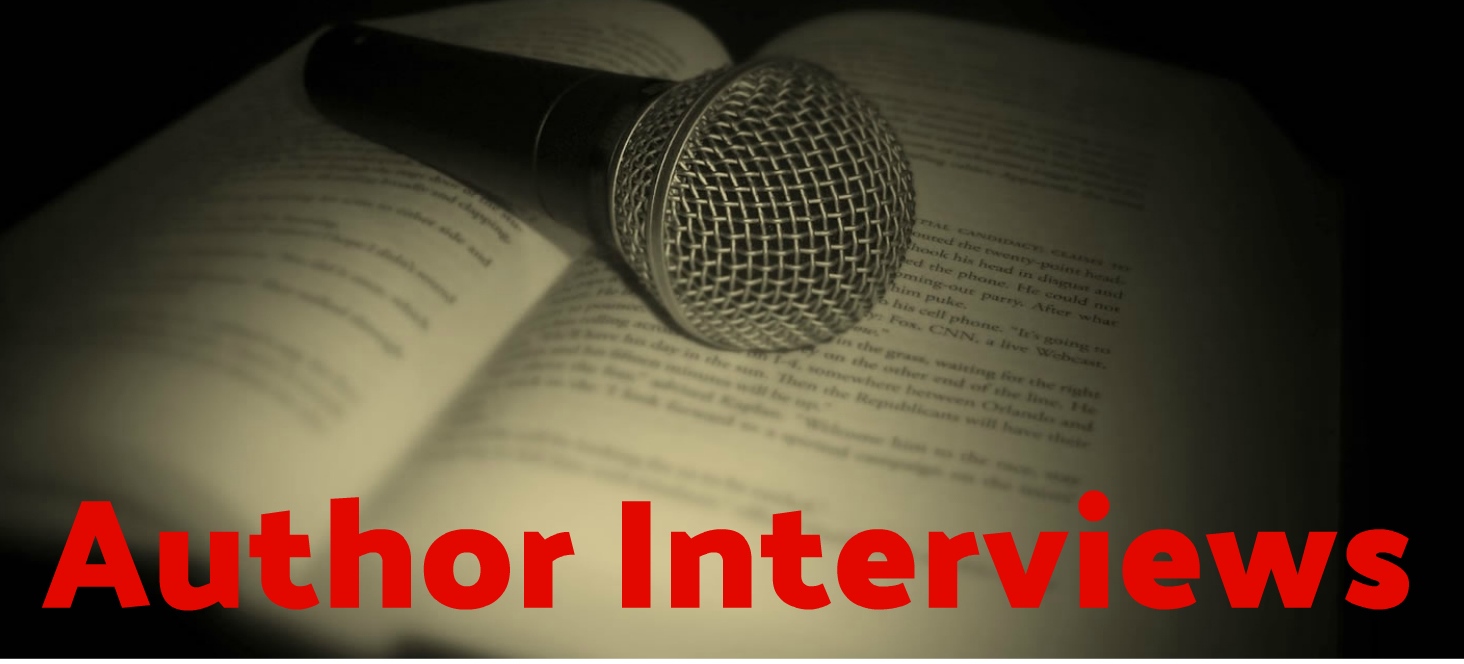
In-Depth Discussions with Today's Darkest Talents
The Science of Michael McBride
By, JG Faherty
Michael McBride is one of the new guns in horror, poised to make a huge impact on the horror scene. A self-proclaimed caffeine addict who manages to pump out books and short stories around his professional career in radiology and his family obligations, his style is hard-hitting, no-holds-barred, in-your-face horror that doesn’t shy away from blood and guts, but doesn’t depend on them, either. A throwback to a time when plot, dialogue, and storyline were more important than the gross-out, McBride crafts stories that will chill you, thrill you, and most likely cause more than a few nightmares.
This busy dark scribe recently took time out from his hectic schedule to discuss his work, his influences, and how to strike that delicate balance between life and career.
Dark Scribe Magazine: First of all, let me say it’s a pleasure to talk to you again. The last time we touched base, you had a story out in Cemetery Dance magazine and two new books ready to hit the market - God’s End: The Fall and The Infected. How are they doing, and what’s new in the pipeline for you?
 Michael McBride: Thanks for the invitation. It’s a pleasure to be involved in any small way with such a promising new magazine. Placing a story in Cemetery Dance was one of my highest ambitions, and seeing “It Rips” in print in Issue 57 was an incredible feeling. CD is an amazing magazine and everyone involved is the epitome of class.
Michael McBride: Thanks for the invitation. It’s a pleasure to be involved in any small way with such a promising new magazine. Placing a story in Cemetery Dance was one of my highest ambitions, and seeing “It Rips” in print in Issue 57 was an incredible feeling. CD is an amazing magazine and everyone involved is the epitome of class.
God’s End: The Fall , an apocalyptic tale of hope, was released as a limited-edition hardcover from Delirium Books and as a mass market paperback from Snowbooks. So far, the response 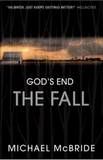 has been wonderful. The Infected, a violent story about a pandemic, should be shipping in January as a limited-edition hardcover from Delirium. The coming year should see the release of the final two books in the God’s End trilogy, The Blizzard of Souls and The Trail of Blood, Chronicles of the Apocalypse: The End Race, Legion of Wrath, Spectral Crossings, and a host of short stories in various magazines and anthologies like High Seas Cthulhu, Holy Horrors, and Horror D’oeuvres.
has been wonderful. The Infected, a violent story about a pandemic, should be shipping in January as a limited-edition hardcover from Delirium. The coming year should see the release of the final two books in the God’s End trilogy, The Blizzard of Souls and The Trail of Blood, Chronicles of the Apocalypse: The End Race, Legion of Wrath, Spectral Crossings, and a host of short stories in various magazines and anthologies like High Seas Cthulhu, Holy Horrors, and Horror D’oeuvres.
Also, my novella, Blood Wish, is available right now from Delirium Books. They did a really great job with it.
Dark Scribe: Talk about a busy schedule! That brings me to my next question: What’s your writing schedule like? How do you balance the job, the writing, and a family?
Michael McBride: That’s the million dollar question, isn’t it? I only wish I knew how to balance everything successfully. I write in every free second available. I now write everything longhand in a spiral notebook since there never seems to be enough time to set up my laptop beside a mug of coffee and leisurely work my way into a story. I have to rehearse the next sections of a book in my head so that when the time comes I can spew it onto the page. If I don’t take advantage of every opportunity, I’ll miss my deadlines and lose the momentum I’ve established. I work full time, and with four kids ranging from one to fifteen, my life is an exercise in chaos. But what’s the alternative? I’m unwilling to give up my family or my writing, and I refuse to allow either to suffer.
Dark Scribe: Many of your stories and novels deal with science run amok. Does your own background in the biological sciences play a role in your stories, either by providing ideas or as an area you’re interested in exploring?
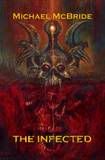 Michael McBride: In my opinion, technology has enabled mankind to rush into monumental discoveries without having established the discipline to handle them responsibly. It will take decades to determine the stochastic effects of microwave and cell phone radiation, but even now there’s a microwave in every home and a cell phone on every ear. What about cloning, genetically-enhanced food sources, and unregulated herbal supplements? We all buy into the hype without a second thought. I expose patients to radiation every day knowing that a single photon can cause significant genetic mutation. Scientific advancement is terrifying. It’s a never-ending supply of story ideas; however, so few present happy endings.
Michael McBride: In my opinion, technology has enabled mankind to rush into monumental discoveries without having established the discipline to handle them responsibly. It will take decades to determine the stochastic effects of microwave and cell phone radiation, but even now there’s a microwave in every home and a cell phone on every ear. What about cloning, genetically-enhanced food sources, and unregulated herbal supplements? We all buy into the hype without a second thought. I expose patients to radiation every day knowing that a single photon can cause significant genetic mutation. Scientific advancement is terrifying. It’s a never-ending supply of story ideas; however, so few present happy endings.
Dark Scribe: Several of your books deal with apocalyptic themes. Is this a concept you’ve got a real interest in, or were they just ideas you happened to have?
Michael McBride: I don’t sit down and decide to write about the end of the world. Quite often, I simply reach a point in a novel where everybody needs to die. Look around and you’ll see dead babies in dumpsters, children starved to death in closets, killing for shoes, mass murder in the name of god. How long before the same soulless monsters that crash planes into buildings full of civilians send their own children into elementary schools with bombs in their backpacks? Maybe the time is right for a pandemic or global disaster to wipe the slate clean. You can’t really argue the logic.
Dark Scribe: How much of your own life and hometown do you incorporate into your work?
Michael McBride: Every character I write is a variation of me, a product of different life choices I could have made along 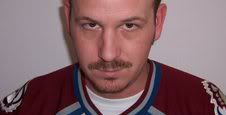 the way. I definitely have my share of characters in medical professions, so some amount of reality bleeds through, but I enjoy researching different careers for my characters, especially those in speculative and theoretical fields. If you’ve read all of my work, you could probably guide a tour through my house, and I’ve used locations in Colorado, both real and imaginary, in most everything I’ve written.
the way. I definitely have my share of characters in medical professions, so some amount of reality bleeds through, but I enjoy researching different careers for my characters, especially those in speculative and theoretical fields. If you’ve read all of my work, you could probably guide a tour through my house, and I’ve used locations in Colorado, both real and imaginary, in most everything I’ve written.
Dark Scribe: What made you want to become a writer?
Michael McBride: I don’t think I ever really had a choice. My muse is a pushy little bugger. If I’m not writing, the ideas won’t let me sleep. Of course, if there was one work that made me aspire to greater things, it would have to be King’s The Stand.
Dark Scribe: One of the hot topics in the writing field today is the state of the publishing environment. As someone who started in the small press and has continued to work your way up with larger printings and higher profile publishers, do you feel that this is becoming the model future writers will likely be following?
Michael McBride: A digital future presents limitless opportunities for authors to change the dynamics of the publishing world. There may come a time when e-books rule and the consumer may not draw a distinction between downloading 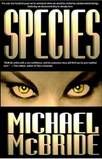 from Random House and from Some Random Guy’s House. Personally, I would never give up a hardback in favor of a handheld electronic device. But that’s just me. As far as my career path, I believe that hard work can put you in the right place at the right time to capitalize on luck. I’ve been fortunate to have worked with some very talented publishers who have helped draw attention to my work from larger circles of readers and higher-profile houses. It’s certainly not the shortest distance between two points or a model I would recommend to new writers, but it has proven successful for many authors, myself included.
from Random House and from Some Random Guy’s House. Personally, I would never give up a hardback in favor of a handheld electronic device. But that’s just me. As far as my career path, I believe that hard work can put you in the right place at the right time to capitalize on luck. I’ve been fortunate to have worked with some very talented publishers who have helped draw attention to my work from larger circles of readers and higher-profile houses. It’s certainly not the shortest distance between two points or a model I would recommend to new writers, but it has proven successful for many authors, myself included.
Dark Scribe: Let’s talk about the horror genre for a moment. There are so many sub-genres out there now - traditional ‘monster’ horror, apocalyptic horror, serial killers and slashers, psychological terror, religious horror, and literary horror. Which types do you prefer to read? Do you see any trends in the field right now?
Michael McBride: I’m happy to read nearly any sub-genre, so long as the book is well-written, well-researched, and the characters engaging. My personal favorites are blends of genres, where convention is sacrificed in favor of breaking new ground. All things being equal, I would probably opt for an apocalyptic novel over a classical monster story, but I would  enjoy either if the author were an excellent wordsmith. The trend in the field seems to be toward supernatural erotica, which doesn’t really turn my crank, but millions of people love it and every publisher wants to buy it. Another movement gaining momentum is using gore as a substitute for characterization. To all the aspiring authors out there, before you try to imitate the visceral ferocity of a Ketchum or Lee, please pay attention to the fact that these guys are stellar writers who can craft three-dimensional characters and plot like nobody else in the business.
enjoy either if the author were an excellent wordsmith. The trend in the field seems to be toward supernatural erotica, which doesn’t really turn my crank, but millions of people love it and every publisher wants to buy it. Another movement gaining momentum is using gore as a substitute for characterization. To all the aspiring authors out there, before you try to imitate the visceral ferocity of a Ketchum or Lee, please pay attention to the fact that these guys are stellar writers who can craft three-dimensional characters and plot like nobody else in the business.
Dark Scribe: What is the number one problem with the horror genre today?
Michael McBride: The substitution of gore and brutality for plot and skilled writing.
Dark Scribe: What sub-genre would you like to see revisited – one that hasn’t been done in awhile or one that hasn’t been done well in the past?
Michael McBride: I would love to read a really good antichrist novel. The Omen was fun, but that was more than thirty years ago. With the changes in the political climate since then, there ought to be some great material kicking around in somebody’s head.
Dark Scribe: Has any book or movie really frightened you?
Michael McBride: The Exorcist scared the living hell out of me. After that one, I was ruined for everything else. Bentley Little can still creep me out from time to time, though.
Dark Scribe: Name the three best horror books - in your opinion - of the last 15 years.
Michael McBride: Blood Crazy by Simon Clark; Speaks the Nightbird by Robert McCammon; and Relic by Douglas Preston and Lincoln Child
Dark Scribe: Who are some of your influences as a writer?
Michael McBride: I was weaned on the greatest of the great: King, Koontz, McCammon, Straub… all phenomenal writers and gifted storytellers. These guys were in my head before I even formulated my own identity. Later, I stumbled upon the  likes of Ketchum, Clegg, Castle, Wilson, Monteleone, Skipp and Spector, Tessier, and on and on. I’d like to think I picked up a little from every one of these amazing writers. Now, looking up, I have a solid list of small press-gone-mass market authors to pattern myself after: Keene, Lebbon, and Moore. I buy everything from Little, Clark, and Preston/Child. Although my primary influence as a writer was my parents, who encouraged me to read anything and everything, and then were more than supportive even in the early years when I produced some utter tripe.
likes of Ketchum, Clegg, Castle, Wilson, Monteleone, Skipp and Spector, Tessier, and on and on. I’d like to think I picked up a little from every one of these amazing writers. Now, looking up, I have a solid list of small press-gone-mass market authors to pattern myself after: Keene, Lebbon, and Moore. I buy everything from Little, Clark, and Preston/Child. Although my primary influence as a writer was my parents, who encouraged me to read anything and everything, and then were more than supportive even in the early years when I produced some utter tripe.
Dark Scribe: You’ve put out novels, novellas, and short stories. Which medium do you enjoy working in the most?
Michael McBride: I’m a novelist at heart. I love characterization: creating living, breathing people on the page who I know and adore, and then subjecting them to the worst stimuli possible to see how they react. Pushing them to their limits and seeing where they break. Since they’re all a piece of me, I live vicariously through them, learning about myself in the process. I enjoy novellas because it’s challenging to create a solid story within the word count restrictions. There’s more weight placed on every sentence, forcing precision of word choice and the elimination of all extraneous information without tipping the ending too soon. Shorts are the hardest for me by far since I tend to be something of a wordy bastard.
Dark Scribe: Many say that reading books is a dying hobby, and writing - let me rephrase that: writing well - is a dying art. What’s your take on that? Do you think movies and video games and television are ruining the next generation of writers and readers?
Michael McBride: People certainly don’t read like they used to for sure. It seems as though with children reading is often more of a punishment than a reward - many thanks to J.K. Rowling for creating some excitement again. My impression of the business side is that more people are writing than reading. With the instant gratification so many vanity presses offer, I only see that trend worsening. It’s hard for a reader to weed through so much garbage to find an actual gem that I understand why the big houses tend to churn out the same tried and true storylines and sign fewer and fewer new authors. This is a capitalistic venture after all.
Growing up in the eighties, you knew a book was good if it was made into a movie, which increased the profile of the book 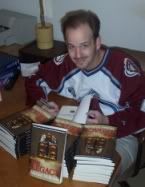 and the author exponentially, seducing readers who might otherwise not have sought out the work. I hesitate to pin the decline of sales on visual media, but Hollywood - which I view as a separate entity - should shoulder much of the blame. Remakes and regurgitations are more solid investments than acquiring new properties, and more and more films serve as star vehicles than solid entertainment. None of this encourages viewers to seek out the story the films were based upon. After all, if you can pick up a DVD for roughly the same price as a paperback…
and the author exponentially, seducing readers who might otherwise not have sought out the work. I hesitate to pin the decline of sales on visual media, but Hollywood - which I view as a separate entity - should shoulder much of the blame. Remakes and regurgitations are more solid investments than acquiring new properties, and more and more films serve as star vehicles than solid entertainment. None of this encourages viewers to seek out the story the films were based upon. After all, if you can pick up a DVD for roughly the same price as a paperback…
Dark Scribe: Do you have any advice for new writers out there, the ones struggling to get their stories and books into print?
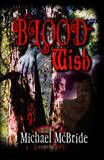 Michael McBride: Keep writing. Don’t sit on those same stories and novels forever, and don’t give in to the vanity call as your name will forever be attached to those poorly-edited books, no matter how incredible you may become in time. Understand the market. If you want to sell a story to Cemetery Dance, make sure you have a good feel for what kind of stories they’re buying. Don’t blindly fire stories at editors or they’re going to know you don’t care enough about their life’s work to actually read it. Study the trends to see which houses and agents are acquiring the kind of material you write and target your submissions. Read everything. This is your homework. If you want to be the best, then you need to know your competition. Remain positive. Don’t whine on message boards about how so and so only got his big deal because he’s so and so’s son or assume that another writer’s good fortune is the product of luck or ingratiation. If you want a shot at the ring, you’d better be willing to devote every free second of your time to improving your craft and working harder than you ever thought you could.
Michael McBride: Keep writing. Don’t sit on those same stories and novels forever, and don’t give in to the vanity call as your name will forever be attached to those poorly-edited books, no matter how incredible you may become in time. Understand the market. If you want to sell a story to Cemetery Dance, make sure you have a good feel for what kind of stories they’re buying. Don’t blindly fire stories at editors or they’re going to know you don’t care enough about their life’s work to actually read it. Study the trends to see which houses and agents are acquiring the kind of material you write and target your submissions. Read everything. This is your homework. If you want to be the best, then you need to know your competition. Remain positive. Don’t whine on message boards about how so and so only got his big deal because he’s so and so’s son or assume that another writer’s good fortune is the product of luck or ingratiation. If you want a shot at the ring, you’d better be willing to devote every free second of your time to improving your craft and working harder than you ever thought you could.
For more information on Michael McBride, visit his official website.
Read DSM's review of Michael McBride's The Infected.



